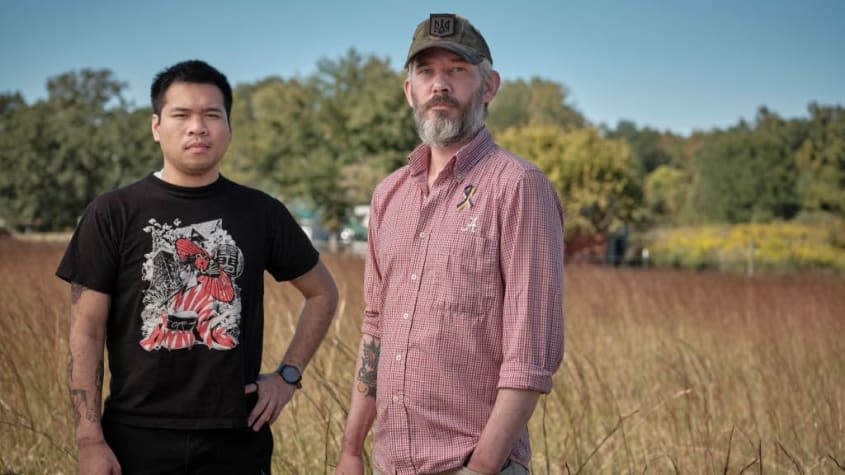American vets captured in Ukraine detail what it was like being in Russian custody

Alex Drueke and Andy Tai Huynh are sharing details for the first time about what happened to them between their June 9 capture in Ukraine and their release from Russian custody in mid-September.
Drueke, 40, and Huynh, 27, spoke with The Washington Post about the interrogations and physical and psychological abuse they went through. The military veterans — Drueke served in the U.S. Army, and Huynh in the U.S. Marines — met in Ukraine in April after joining the International Legion of Territorial Defense of Ukraine. They later joined the Task Force Baguette military unit together, and were captured on a drone reconnaissance mission north of Kharkiv.
Drueke and Huynh told the Post their unit was ambushed, and everyone went their separate ways. Drueke and Huynh did not detail how and where they were captured by Russian troops, only saying they were first brought to a "tent city" in Russia with other captives.
Drueke said the interrogations were "horrible," the men were asked repeatedly if they were in the CIA, were beaten and deprived of sleep, and the Russians "really thought that we had been sent by our government, or had a large amount of government support." They were taken next to eastern Ukraine, where they were held in a cold basement and given dirty water and a loaf of bread a day. The men said they were beaten and asked to identify people in photos they had never seen before and call random organizations in the United States, like the Veterans Crisis Line. Drueke and Huynh said they believe Russian intelligence officials were leading these interrogations.
Their final holding place was a prison-like complex infested with bed bugs; Huynh has bite scars on his back. The men were freed on Sept. 21 as part of a prisoner exchange between Russia and Ukraine, after 104 days in captivity. Both say they have numbness in their hands, welts on their wrists from being bound, and lost close to 30 pounds during their time in Russian custody. Drueke also may have broken four ribs, and Huynh told the Post he has short-term memory loss and his mind "deteriorated" over the last several months.
The men decided to speak with the Post to bring attention to the Ukrainian military's needs and to try to gain freedom for Suedi Murekezi, another American veteran who shared a cell with them. "It sounds trite, but we were given a second chance at life," Drueke told the Post. "I feel like our experiences, if we handle them the right way, we potentially have a lot to give the world."
You may also like
5 scathing cartoons about Trump's spiraling legal woes
National Archives says some Trump administration records are still missing

